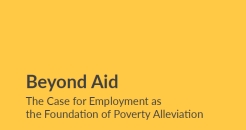 Beyond Aid - employment is the foundation of poverty alleviation
Beyond Aid - employment is the foundation of poverty alleviation
From a report by Sinapis
Aid helps families survive and, in some cases, move out of extreme poverty, which the World Bank defines as living on $2.15 per person per day. But aid doesn’t fundamentally change these families’ opportunities. Aid doesn’t change the economic outlook of the country. In fact, studies have shown that in many cases, foreign aid negatively impacts the economic growth of a developing country in the long term. With an influx of aid programs, countries and their people become slightly less poor, but they fail to escape poverty.
A job, however, fundamentally changes the opportunities that families have. It enables families to pay for what they need. A job not only brings the security of knowing basic needs can be met, but it provides the dignity and the independence to meet needs without having to ask for help.
Sinapis focuses on job creation in such economies. They equip entrepreneurs with the knowledge, tools, and community they need to grow, scale, and access capital. And as they grow, they create jobs. The 3,370 business owners they have served, together provide over 12,000 jobs across markets that desperately need economic growth. These jobs are the key to ultimately changing the future for these countries.
Job creation growth has long been correlated with economic growth across developed economies. In Kenya, the correlation between employment growth and GDP output over the past 35 years is that the economy grows at almost exactly the same rate as the rate of job creation.
So, where do these jobs come from? In emerging markets, 70% of all formal jobs created over the past decade come from micro, small, and medium enterprises (MSMEs). In Kenya in particular, 96% of jobs created come from MSMEs.
But are all jobs created equal? What kinds of jobs lead to this kind of economic growth? Research shows that the creation of informal jobs, which are unregulated and untaxed, may reduce extreme poverty in a way similar to providing aid. But only the creation of formal jobs is associated with broad poverty reduction and movement toward a more developed economy. MSMEs that create formal jobs, therefore, are the catalyst for long-term, sustained economic growth.
To more deeply understand the transformative effect of a job on an employee and their family, in 2024, Sinapis conducted a series of surveys and focus groups with a sample of their alumni. They sought to understand whether the jobs created by the alumni were providing holistic opportunities for employees to thrive. They found the following six indicators of “decent work” (as defined by the Aspen Network of Development Entrepreneurs (ANDE)) across a sample of 623 alumni:
-
Fair income. The alumni pay above minimum wage to 84% of their employees, and they have increased salaries by an average of 17.5% over the past two years. They have found that fair salaries also lead to better business outcomes.
-
Secure employment and safe working conditions. Two-thirds of the employees working for the alumni have been working at least two years with the same company, indicating that these business owners are intent on providing secure, long-term opportunities for their staff. Additionally, 68% of the alumni have written policies on safe working conditions.
-
Equal opportunities and treatment for all. Women represent 43% of all formal jobs provided by the alumni, and youth represent 53%. 87% of the alumni provide mentorship to their employees, and 48% disciple employees, indicating a strong, shared commitment across these business owners to creating a life-giving culture in their workplaces.
-
Social protection for workers and their families. The jobs provided by the alumni are mostly formal jobs, with 77% of alumni reporting that they pay taxes for their employees. In economies where only 15-30% of jobs are formal, these jobs guarantee stable, regulated income and social security payments, which are required as part of tax filing. Even though it’s not required in East Africa, 52% of the alumni provide health care benefits to their employees. Beyond this critical social protection, 78% provide meals for their staff during the workday, with most indicating they provide two full meals free of charge.
-
Prospects for personal development. To support their employees’ career growth, 83% of the businesses surveyed provide professional training or development funds. One of our alumni shared how an employee obtained a much higher-paying job at another firm because of the development she received at the initial company.
-
Free expression and organization. While few (14%) of the alumni had specific policies regarding workers’ rights to free expression, several shared stories about how their employees came together to propose solutions to improve the lives of the team.
These entrepreneurs are indeed creating the types of jobs across East Africa that will lead to sustained economic change in their countries. These jobs bring hope and expanding opportunities for thousands of people. Does this lead to grant policy changes for trustees and leaders who are able to grant monies to organisations in developing countries? And doing this directly means 100% of monies could be used, rather than money taken for admin costs in the UK.
Read the Sinapis report here.
Retweet about this article:
From a report by Sinapis, 08/07/2025